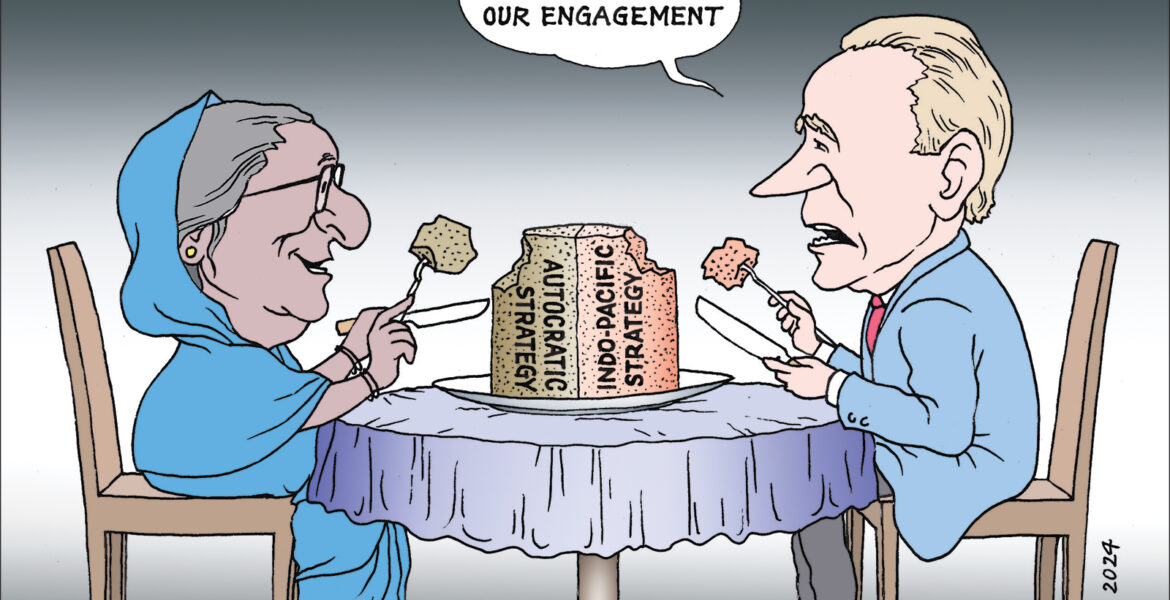Growing up, we didn’t have nearly as many entertainment options as kids do today. In this environment, Charles Schultz’s Peanuts cartoon served as a cultural touchstone for my generation. We all watched cartoons featuring Charlie Brown and his friends and considered the Peanuts gang’s holiday specials as the truest sign that a new season was upon us. One iconic scene from the cartoon involves Charlie Brown and his “friend” Lucy Van Pelt playing football. Charlie Brown lines up to kick with Lucy holding the ball. Charlie is understandably wary that history will repeat itself and he will go flying when Lucy moves the football at the last minute. Despite his misgivings, Charlie chooses to believe Lucy’s assurances that this time will be different and attempts the kick—with predictable comic results. This scene serves as a metaphor for the perils of again trusting those who have a track record of disappointing us.
As I think about U.S. policy towards Bangladesh over the past several months, I can’t help shaking the feeling that those who believed that Washington would act differently than it had in 2014 and 2018 and stay true to its professed commitment to democracy and human rights, fell into the same trap that Charlie Brown had. Despite knowing that past U.S. rhetoric about democracy and rights had proven hollow, many had convinced themselves that this time would be different. I freely admit to having fallen into this category, despite having witnessed U.S. policy failures in the past firsthand. It had appeared that the Biden Administration had adopted a principled policy which differed from those of its predecessors after determining that Bangladesh was the right place to promote its values agenda. While it was predictable that other nations would not follow suit, it seemed that this had already been factored into U.S. policymaking in early 2023, and the Administration was committed to following through on the policy announced in May to hold accountable those who undermined the democratic electoral process. With this in mind, the publication of President Biden’s post-election letter to PM Hasina was devastating as it clearly showed that this would not be the case, with the U.S. joining others returning to business-as-usual post-January 7.
I will leave it to others to speculate on what caused the U.S. to change course and fall in line with those abandoning the cause of democracy and human rights. While there are numerous theories, ranging from India’s influence to the impact of events in Israel/Gaza and Ukraine and their impact on U.S. policy, only those on the inside really know why the Biden Administration so dramatically shifted course. More important than why the Biden Administration changed policy, however, is the impact of these decisions on those in Bangladesh and elsewhere who were counting on Washington’s support in their struggle for democracy and human rights. Understandably, these activists now find themselves confused and angry over having been abandoned by what they thought was their most committed international ally. At the same time, autocrats around the world must feel emboldened and will no doubt congratulate PM Hasina for having outmaneuvered President Biden. After all, one has to give the devil her due.
As I have written before, ultimately the people of Bangladesh will determine their own democratic destiny. Going forward, those who advocate for human rights and democracy will need to convince their fellow citizens to continue the struggle. I do not underestimate how difficult this will be given the resources that the regime has at its disposal. It will also no doubt be more difficult after the events of the past several months. At the same time, I continue to share Dr. King’s view that “the arc of the moral universe is long and bends towards justice” and believe that eventually democracy will return to Bangladesh. As such, my message to those who now feel abandoned by the Biden Administration is that they should not lose hope, even as I understand and share their disappointment with the shift in U.S. policy. For my small part, I will continue to advocate for the rights of all Bangladeshis, and I urge others to do so as well. To my former colleagues in the U.S. government, my simple question is why they think that doing the same thing as before (i.e. pursuing a policy of engagement) will result in a democratic Bangladesh. Doing the same thing over and over and expecting different results is how Einstein defined insanity.

